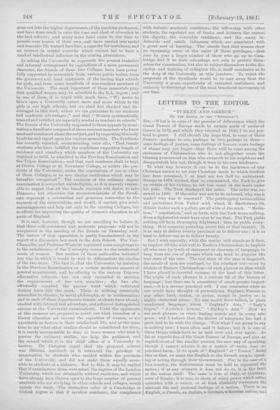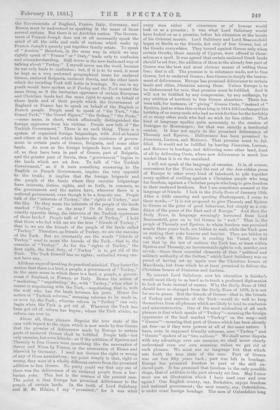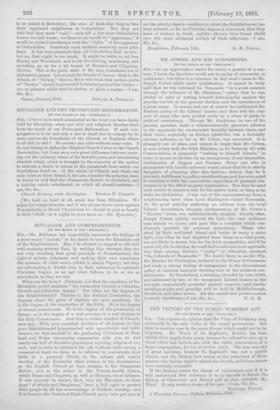LETTERS TO THE EDITOR. •
"TURKEY AND GREECE."
[To TILE EDITOR OF TIM " EPROTATOR.1
Sin,—What is to come of the promise of deliverance which the Great Powers of Europe made to certain parts of enslaved Greece in 1878, and which they renewed in 1880, I do not pre- tend to guess. I still cherish the hope that, in some of those Powers—perhaps in one, perhaps in two, perhaps in three- some feelings of justice, some feelings of honour, some feelings of shame may yet linger—that there still be some among the statesmen of Christendom who do not altogether scorn the blessing pronounced on him who sweareth to his neighbour aud disappointeth him not, though it were to his own hindrance.
In what way however it can be to the hindrance of any Christian nation to set free Christian lands to which freedom has been promised, I at least am too dull to understand. Europe in 1878 invited, that is, commanded, the Turk to give up certain of his victims, to set free some of the lands under his yoke. The Turk disobeyed the order. The order was re- newed in 1880. If the order was not to be enforced, why was it made P why was it renewed P The pettifogging technicalities and quotations from Vatted with which M. Barth6lemy St. Hilaire makes such a pother, are all wide of the mark. "
"negotiation," and so forth, with the Turk mean nothing. Even a diplomatist must have eyes to see that. The Turk yields nothing till he is thoroughly frightened ; then he yields every- thing. it is nonsense pottering about this or that frontier. It is as easy to deliver twenty provinces as to (deliver one ; it is as hard to deliver one as to deliver twenty.
But I wish specially, while the matter still stands as it does, to implore all who wish well to Eastern Christendom, to implore all who care for truth of statement or clearness of language, to keep from the use of phrases which only tend. to disguise the true state of the case. The real state of the case is disguised, the minds of men are confused, by the constant use—even by friends of Eastern Christendom—of such phrases as that which I have placed in inverted commas at the head of this letter. The origin of such phrases is a curious bit of the history of language ; but their use is something of much greater import- ance,—it is a serious practical evil. I can remember when no one would have thought of personifying England, France, or any other land, nation, or power, except in poetry or in highly rhetorical prose. No one would have talked, in plain unadorned language, about "England's duty'," " hopes," " Austria's honour," " Turkey's debts" Now we see such phrases in every leading article and in every tele- gram; and I believe that the dialect of telegrams has had a good deal to do with the change. Now what I am going to say is nothing now; I have often said it before ; but it is one of those things which have to be said over and over again. As far as regards five of the Great Powers of Europe, and also as regards most of the smaller powers, the now way of speaking, though I cannot admire it as a matter of taste, does no practical harm. If we speak of " England " or " France " doing this or that, we mean the English or the French people, speak- ing or acting through their Government. For, in the case of a free country, the Government must be held to represent the nation; if at any moment it does not do so, it is the fault of the nation itself. The same is true of Italy, of Germany, even of Russia ; it is true, in short, of every power which either coincides with a nation, or at least distinctly represents the
national life and national feelings of a nation. There is an English, a French, an Italian, a German, a Russian nation, and. The Governments of England, France, Italy, Germany, and Russia must be understood as speaking in the name of those several nations. But there is no Austrian nation. The Govern- ment of Francis Joseph does not at all necessarily speak the mind of all the odds and ends of nations which make up Francis Joseph's queerly put together family estate. To speak of "Austria " therefore, in the same way in which we may rightly speak of " France" or "Italy," leads only to confusion and misunderstanding, Still worse is the new-fashioned way of talking about "Turkey." I myself never use the word, because its use only leads to confusion ; but, if it is to be used, it must be kept as a very awkward geographical name for enslaved Greece, enslaved Bulgaria, enslaved Servia, and the other lands which the invading Turk still holds in bondage. No one in my youth would have spoken as if Turkey and the Turk meant the same thing, as if the barbarian oppressor of certain European and Christian lauds had the same right to speak on behalf of those lands and of their people which the Government of England or France has to speak on behalf of the English or French people. People used. to speak of "the Turk," the ..Grand Turk," "the Grand Signor," '' the Sultan," "the Porte," —some name, in short, which effectually distinguished the foreign oppressor from his victims. People now talk of "the Turkish Government." There is no such thing. There is a system of organised foreign brigandage, with Abdal-hamiti and others at its head, which hinders the existence of govern- ment in certain parts of Greece, Bulgaria, and some other lands. As soon as the foreign brigands have been got rid of, as they have been in part of Greece, part of Bulgaria, and the greater part of Servia, then " government " begins in the lands which are set free. To talk of "the Turkish Government," as if it were something answering to the English or French Government, implies the very opposite to the truth ; it implies that the foreign brigands and the people of the lands where they exercise brigandage have interests, duties, rights, and so forth, in common, as the government and the nation have, wherever there is a national government, even though it be a despotic one. People talk of the "interests of Turkey," the "rights of Turkey," and the like. Do they mean the interests of the people of the lands marked " Turkey " on the map ? Or do they mean that exactly opposite thing, the interests of the Turkish oppressors -of those lands P People talk of "friends of Turkey." I hold that those who feel with me are the true "friends of Turkey ;" That is, we are the friends of the people of the lauds called 'Turkey." Therefore, as friends of Turkey, we are the enemies -of the Turk. But we constantly see the words "friends of Turkey" used to mean the friends of the Turk,—that is, the -enemies of " Tarkey:" As for the " rights of Turkey," the first right, the first duty, of " Turkey " is to get rid of the Turk. The Turk himself has no rights ; embodied wrong can- not have any.
All th ese ways of speaking do practical mischief. They foster the notion that there is a land, a people, a government of "Turkey," in the same sense in which there is a land, a people, a govern- meat of England, or France, or Italy. Hence the notion of 4' mediating," "negotiating," &c., with " Turkey," when what is meant is negotiating with the Tark,—nogotiating, that is, with The wolf who has the lamb between his jaws. Hence the notion of "Turkish reforms," meaning reforms to be made in, or even by, the Turk ; whereas reform in " Turkey " can only begin when the Turk is got rid of. Wherever the Turk has been got rid, of, reform has begun ; whore the Turk abides, no reform can ever be.
Above all, these phrases disguise the true state of the .case with regard to the claim which is now made by free Greece that the promise of deliverance made by Europe to certain parts of euslaved Greece shall be fulfilled. People talk—not only enemies, but even friencls—as if the addition of Epeiros and 'Thessaly to free Greece were something like the annexation of .Savoy and Nizza by France, or the annexation of Elsass and Sleswick by Germany. I need not discuss the right or wrong sf any of those annexations ; my point simply is that, right or wrong, they were of a wholly different nature from the promised addition to free Greece. No party could say that any one of them was the deliverance of an enslaved people from a bar- barian yoke. This last is the essence of the present case. The point is that Europe has promised deliverance to the people of certain lands. In the teeth of Lord Salisbury and M. .St. Hilaire, I say "promised ;" for it was 'what every man either of conscience or of honour would look on as a promise ; it was what Lord Salisbury would have looked on as a promise, before his education at the hands of his Oriental master. Lord Salisbury and Lord Beaconsfielki began at Berlin as the friends, not only of free Greece, but of the Greeks everywhre. They turned against Greece only when certain Greeks, those namely of Cyprus, were offered to them- selves as a spoil. It was agreed that certain enslaved Greek lands should be set free ; the addition of thorn to the already free part of Greece was the best and most obvious means of setting them free ; that is all. The promise is in substance made, not to free Greece, but to enslaved Greece ; free Greece is simply the instru- ment of deliverance. Europe has promised deliverance to certain lauds and cities, joa.nnina among them. Unless Europe is to be dishonoured for ever, that promise must be fulfilled. And it will not be fulfilled by any compromise, by any exchange, by any addition of territory to free Greece elsewhere. There has been talk, for instance, of " giving " Greece Crete, "instead of" Epeiros, just as when this or that king in 1814-1815 exchangedthe lordship of so many souls who had no wish for him for the lordship of so many other souls who had no wish for him either. That kind of language applies quite accurately to the cession of Duleigno to Montenegro ; for that was strictly a territorial cession. It does not apply to the promised deliverance of Thessaly and Epeiros. Deliverance has been promised to Joannina, Larissa, and Metzovo. That promise must be ful- filled. It would not be fulfilled by leaving Jeannine, Larissa, and Metzovo in bondage, and. delivering some other land, least of all by delivering Crete, where now deliverance is much less needed than it is on the mainland.
I will not speak of the language of enemies. It is, of course, convenient for the Times and the rest of the Jew-ridden press of Europe to utter every kind of falsehood, to pile together every epithet of reviling against a Christian people who long for freedom, against a Christian people who long to give freedom to their enslaved brethren. But I am sometimes amazed at the language of friends. I look in the Daily News of January 19th. After a little sneering and quoting Shakespeare, I conic to these words,—" It is not proposed to give Thessaly and Epirus to Greece as the prize of good behaviour, bat simply as a con- dition of the peace of the East and of Europe." And then the Daily News, in language seemingly borrowed from Lord Beaconsfield, goes on to bid Greece to "wait." That is, the people of Thessaly and Epeiros, to whom freedom was promised nearly three years back, are bidden to wait, while the Turk goes on making their yoke heavier and heavier. They are bidden to wait, while M. St. Hilaire is reading his Vattel, to find out that by the law of nations the Turk has, at least within Epeiros and Thessaly, an incontestable right to rob, murder, and ravish,—those three essential elements of that "political and military authority of the Sultan," which Lord Salisbury was so proud of having set up again over the Christian homes of Macedonia, but from which he at least promised to deliver the Christian homes of J6annina and Larissa.
To convert Lord Salisbury, now his education is finished, would most likely he as bard as to teach a professed diplomatist to look at facts instead of names. Why the Daily News of 1881 should have so changed from the Daily News of 1876, it is not for me to guess. But the friends of Greece—that is, the friends of Turkey and enemies of the Turk—would do well to keep themselves from all phrases which are likely to lead to confusion and misconstruction. One of the most misleading of all such phrases is that which speaks of " Turkey"— meaning the foreign oppressors of the laud marked "Turkey" on the map—and "Greece "—meaning that part of Greece which has been already set free—as if they were powers at all of the same nature. I have, even in supposed friendly columns, seen " Turkey " and. " Greece " spoken of as "two nations." We shall never dispute with any advantage over our enemies, we shall never clearly understand even our own meaning, unless we get rid of such phrases. We must use no language but that which sets forth the true state of the case. Part of Greece was set free fifty years back ; part was left in bondage. Europe has promised freedom to part of the still en- slaved part. lt has promised that freedom in the only possible shape, that of addition to the part already set free. May I once more use an illustration which I have used over and over again ? One English county, say, Berkshire, enjoys freedom and national government ; the next county, say, Oxfordshire,. is under cruel foreign bondage. The men of Oxfordshire long
to be joined to Berkshire; the men of Berkshire long to free their oppressed neighbours in Oxfordshire. But they are told that they must " wait,"—wait till a few more Oxfordshire homes are laid waste ; for them to stir would be "aggression," it would be wicked interference with the " rights " of the oppressor of Oxfordshire. Somebody must mediate, Homebody must arbi- trate. It has been promised that all Oxfordshire shall be free ; but no, that might be too much, It might be better to set free Henley and. Woodstock, and to let the robbing, murdering, and ravishing go on for a bit longer at Banbury and Chipping- Norton. This is the plain state of the case, translated. out of diplomatic jargon. Let at least the friends of Greece—that is, the friends of "Turkey," that is, those who wish that certain parts of" Turkey" should. bepromoted to become parts of free Greece— use no phrases which tend to darken so plain a matter.—I am, Sir, ac.,




































 Previous page
Previous page